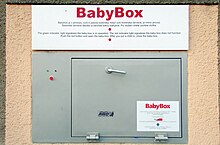


A baby hatch or baby box[1] is a place where people (typically mothers) can leave babies, usually newborn, anonymously in a safe place to be found and cared for. This was common from the Middle Ages to the 18th and 19th centuries, when the device was known as a foundling wheel. Foundling wheels were abandoned in the late 19th century, but a modern form, the baby hatch, was reintroduced from 1952[2] and since 2000 has been adopted in many countries, most notably in Pakistan where there are more than 300. They can also be found in Germany (100), the United States (150), [3] Czech Republic (88)[4] and Poland (67).[2]
The hatches are usually in hospitals, social centres, or churches, and consist of a door or flap in an outside wall which opens onto a soft bed, heated or at least insulated. Sensors in modern beds issue an alert when a baby has been placed in it. In Germany, babies are looked after for eight weeks during which the parent can return and claim the child without any legal repercussions. If this does not happen, the child is put up for adoption.
- ^ Parco, Nicholas (3 May 2016). "First baby drop-off boxes for unwanted infants installed in Indiana". nydailynews.com. Retrieved 27 June 2019.
- ^ a b Hibbert, Katharine (21 May 2006). "The Child Catchers". The Times. London. Archived from the original on 2 December 2008. Retrieved 30 June 2008.
- ^ The 'baby box' returns to Europe, BBC News, 26 June 2012
- ^ "BABYBOX Statistiky babyboxů". www.babybox.cz. Retrieved 19 April 2024.